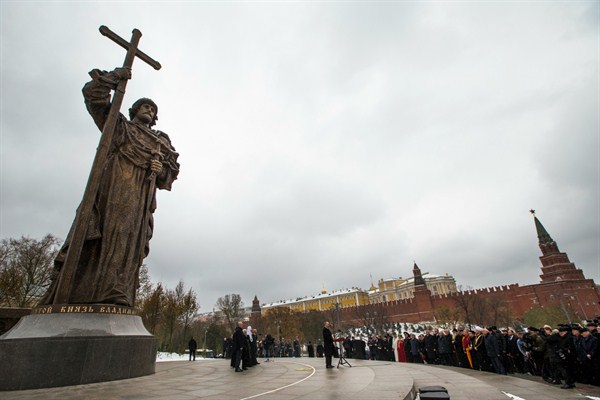There is a new landmark in Moscow, opposite the towering ramparts of the Kremlin’s Borovitskaya Gate. That imposing fortified passage, through which presidential motorcades traditionally enter and exit, now shares its position on the Kremlin’s southern flank with an enormous statue of Vladimir, which was unveiled late last year. This Vladimir is not Putin, but the sainted Grand Prince Vladimir of Kiev, whose baptism signaled the conversion of the Rus’ to Orthodox Christianity in the 10th century, and the alignment of their vast Eastern European empire with Constantinople and the heirs of Rome. Notably, the baptism of Vladimir—the first step of the so-called Baptism of the Rus’—took place neither in Moscow nor in Kiev, but in Crimea.
This symbolism is not lost on Russian officials or ordinary Moscovites. Both understand that just as Soviet and post-Soviet rulers have governed Russia from the Kremlin, they now seek to assert their sway over lands once ruled by Vladimir. The conviction that Crimea is legitimately Russian land—never again to be lost, bartered or leased—has become a catechism. As for the rest of Ukraine, Russians see a mix of a grim but acceptable status quo and developments that may gradually break in their favor. That is why, for now at least, Moscow’s strategy is to stay the course there.
Russians pay close attention to Ukraine’s domestic politics, since longstanding ties to various Ukrainian political and oligarchic factions often yield inside information about plans and vulnerabilities relevant to Kiev’s capabilities and policies. Yet the Moscow elite’s conclusions about Ukrainian politics remain lopsided. The majority actually seems to agree with the thrust of allegations broadcast on Russian television that the Ukrainian state has fallen victim to a cabal of neo-fascists, backed by sinister Western business interests and special services. At the same time, they cannot fully appreciate the degree to which the basic worldview of millions of ordinary Ukrainians has shifted in response to Russia’s seizure of Crimea and support for separatism in Eastern Ukraine.

